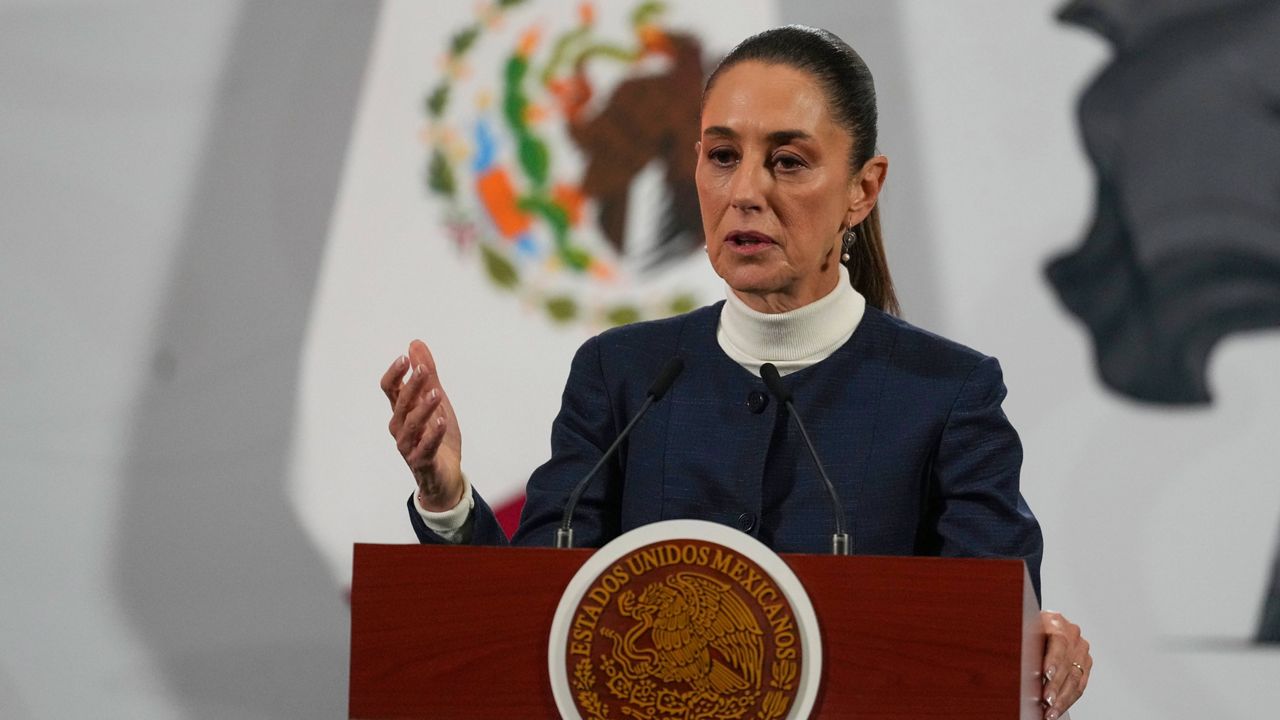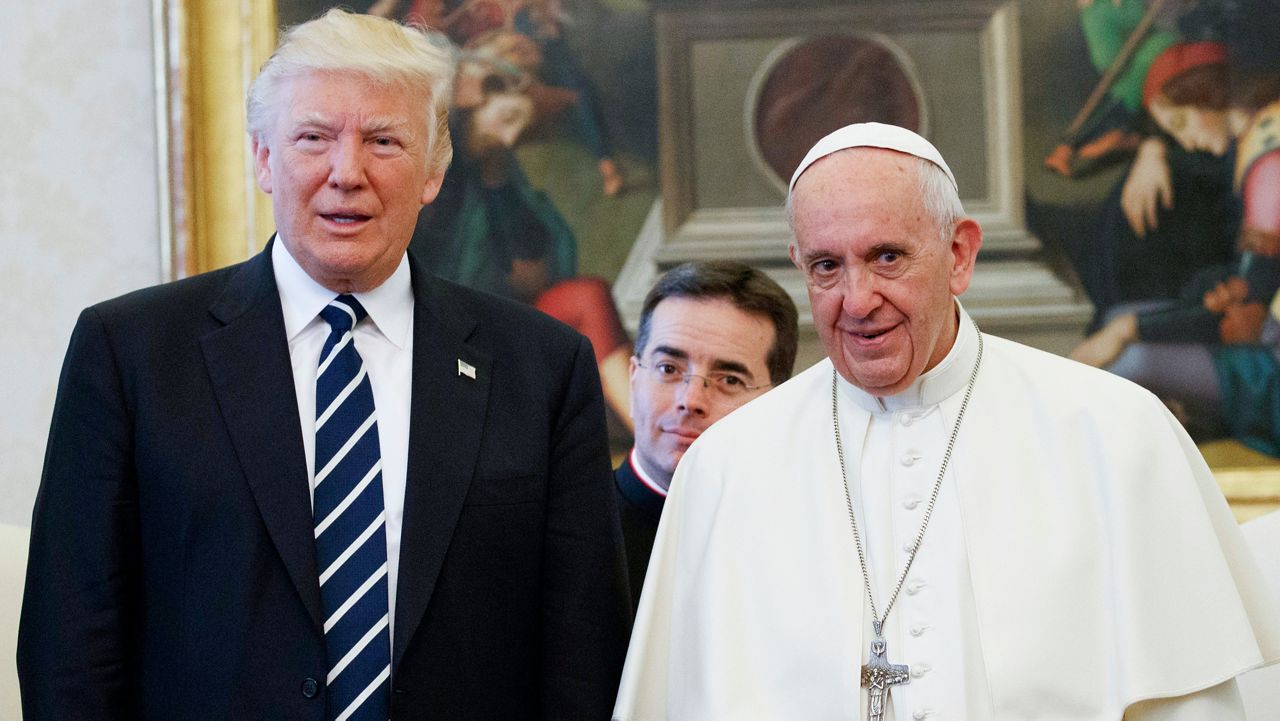U.S. special forces carried out what the Pentagon said was a large-scale counterterrorism raid in northwestern Syria early Thursday. President Joe Biden said in a statement Islamic State leader Abu Ibrahim al-Hashimi al-Qurayshi was killed.
"The United States military forces successfully removed a major terrorist threat to the world — the global leader of ISIS," Biden said later Thursday morning at the White House.
What You Need To Know
- U.S. special forces carried out what the Pentagon said was a large-scale counterterrorism raid in northwestern Syria, which saw Islamic State leader Abu Ibrahim al-Hashimi al-Qurayshi, also known as Haji Abdullah, killed
- Biden confirmed that al-Qurayshi died by exploding a bomb which killed himself, along with members of his family, including women and children, as U.S. forces approached, similar to the death of his predecessor, Abu Bakr al-Baghdadi
- Biden said he directed the Defense Department to "take every precaution possible" to minimize civilian casualties; A White House official said that "all casualties at the site were due to the acts of ISIS terrorists"
- Officials said that "some of the numbers that are reported out there do not align with with our information" regarding civilian casualties; The Pentagon did not provide details on casualties
Biden confirmed that al-Qurayshi died by exploding a bomb which killed himself, along with members of his family, including women and children, as U.S. forces approached.
Thursday's operation came as the Islamic State group was reasserting itself in Syria and Iraq, carrying out some of its biggest attacks since it was defeated in 2019. In recent weeks and months, the group has launched a series of operations in the region, including a 10-day assault late last month to seize a prison in northeastern Syria.
The death of al-Qurayshi was similar to that of his predecessor, Abu Bakr al-Baghdadi, who died in October of 2019. Shortly after, al-Qurayshi, also known as Haji Abdullah, took over the organization.
"Since then, ISIS has directed terrorist operations targeting Americans, our allies and our partners and countless civilians in the Middle East, in Africa and in South Asia," President Joe Biden said, addressing the American people Wednesday morning.
Biden said that al-Qurayshi "oversaw the spread of ISIS-affiliated terrorist groups around the world after savaging communities and murdering innocents." Biden blamed him for the attack on the prison in Syria and called him the "driving force" in the genocide against the Yazidi religious minority in northwestern Iraq in 2014.
"We all remember the gut-wrenching stories, the mass slaughters that wiped out entire villages," Biden said. "Thousands of women and young girls sold into slavery, raped, used as a weapon of war."
"Thanks to the bravery of our troops, this horrible terrorist leader is no more," the president said, saying that U.S. forces carried out the operation "with their signature preparation and precision."
Biden said he directed the Defense Department to "take every precaution possible" to minimize civilian casualties to the best of their ability.
"Knowing that this terorrist had chosen to surround himself with families, including children, we made a choice to pursue a Special Forces raid at a much greater risk to our own people, rather than targeting him with an air strike," Biden said. "We made this choice to minimize civilian casualties."
Biden called al-Qurayshi's decision to blow himself up rather than "face justice for the crimes he has committed" a "final act of desparate cowardice," which resulted in him "taking several members of his family with him."
Biden praised U.S. forces for their skill and bravery in carrying out the operation, calling the military the "solid steel backbone" of the country.
"I'm determined to protect the American people from terrorist threats, and I'll take decisive action to protect this country," Biden said. "We remain vigilant. We remain prepared. Last night's operation took a major terrorist leader off the battlefield and has sent a strong message to terrorists around the world: We will come after you and find you."
In a statement earlier Thursday morning, President Biden said he ordered the operation to "protect the American people and our Allies, and make the world a safer place."
"Thanks to the skill and bravery of our Armed Forces, we have taken off the battlefield Abu Ibrahim al-Hashimi al-Qurayshi—the leader of ISIS," Biden wrote. "All Americans have returned safely from the operation. I will deliver remarks to the American people later this morning. May God protect our troops."
)
Speaking to reporters, a White House official reiterated Biden's message that "the world as a safer place with him gone," noting calling al-Qurayshi the "driving force" behind the genocide of the Yazidi religious minority in Iraq in 2014, was directly overseeing ISIS operations across Iraq and Syria and supervised a network "that included ISIS branches around the world from Africa to Afghanistan."
Al-Qurayshi, the official said "coordinated the group's global terror operations to include directing operations that pose a direct threat to the American people and our partners around the world."
Al-Qurayshi had kept an extremely low profile since he took over leadership of the Islamic State. He had not appeared in public, and rarely released any audio recordings. His influence and day-to-day involvement in the group’s operations was not known and it is difficult to gauge how his death will affect the group.
Officials said that al-Qurayshi never left the third floor of the building, save to bathe on the building's roof. He "commanded by couriers who came and went" from the building.
His killing is a significant blow just as the group had been trying to reassert itself in Syria and Iraq.
Both Biden and Pentagon press secretary John Kirby called the mission successful.
"There were no U.S. casualties," Kirby said in a brief statement. More information will be provided as it becomes available."
A journalist on assignment for The Associated Press and several residents said they saw body parts scattered near the site of the raid, a house in Syria's rebel-held Idlib province. Most residents said the raid involved helicopters, explosions and machine-gun fire.
An official said the operation was "months in planning," and that President Biden "directed the Department of Defense to take every precaution to minimize noncombatant casualties," which posed a challenge as al-Qurayshi appeared to "purposely" live in a residential building with families living on the first floor. The U.S. believed they had nothing to do with ISIS, and the official said that a woman, man and "a number of children" were safely removed from the site.
Unfortunately, the official said, the blast detonated by al-Qurayshi was so large that it killed himself and others, including his wife and children: "All casualties at the site were due to the acts of ISIS terrorists."
The blast, officials said, was "so large that it blew bodies outside of the house and into surrounding areas."
After the blast, an associate of al-Qurayshi and ISIS lieutenant "barricaded himself and members of his own family in the second floor." The lieutenant engaged the assault force with his wife, and were killed, after which a number of children came out from the second floor and were safely evacuated.
Officials said that U.S. forces took a number of efforts to protect civilians and prevent noncombatant casualties, including conducting "call outs," announcing their presence so innocent bystanders could leave, but noted that they made an "explicit decision to conduct a raid as opposed to a standoff."
Officials also said that a U.S. helicopter experienced mechanical issues unrelated to the attack, and U.S. forces made a decision to disable and destroy it.
Idlib is broadly controlled by Turkey-backed fighters, but is also an al-Qaida stronghold and home to several of its top operatives. Other militants, including extremists from the rival IS group, have also found refuge in the region.
The top floor of the two-story house, surrounded by olive trees, was almost totally destroyed in Thursday's raid, with the ceiling and walls knocked out.
Blood could be seen on the walls and floor of the remaining structure, which contained a wrecked bedroom with a child's wooden crib on the floor. On one damaged wall, a blue plastic swing for children was still hanging. The kitchen was blackened with fire damage.
The opposition-run Syrian Civil Defense, first responders also known as the White Helmets, said 13 people were killed in shelling and clashes that ensued after U.S. the commando raid. They included six children and four women, it said.
The Britain-based Syrian Observatory for Human Rights, an opposition war monitor, also said the strike killed 13 people, including four children and two women. Ahmad Rahhal, a citizen journalist who visited the site, reported seeing 12 bodies.
White House officials said that "some of the numbers that are reported out there do not align with with our information" regarding civilian casualties. The Pentagon did not provide details on casualties.
Residents and activists described witnessing a large ground assault, with U.S. forces using megaphones urging women and children to leave the area.
A nearby resident said the doors and windows of his house started to rattle to the sound of low-flying aircraft at 1:10 a.m. local time. He then heard a man, speaking Arabic with an Iraqi or Saudi accent through a loudspeaker, urging women to surrender or leave the area. Through slickly engineered propaganda, including brutal beheading videos, IS emerged as a dominant global extremist threat in the past decade. Its clarion call to followers in the West to either join its self-described caliphate in Syria, or to commit acts of violence at home, inspired killings in the U.S. as well as thousands of travelers determined to become foreign fighters. The allure of IS to would-be militants has proved challenging for the West to fully stamp out even amid leadership changes and U.S. military strikes and raids.
At the height of its territorial conquests around 2014, the Islamic State controlled more than 40,000 square miles stretching from Syria to Iraq and ruled over 8 million people.
The Islamic State group has been reasserting itself in Syria and Iraq with increased attacks.
Last month, it carried out its biggest military operation since it was defeated and its members scattered underground in 2019: an attack on a prison in northeast Syria holding at least 3,000 IS detainees. The attack appeared aimed to break free senior IS operatives in the prison.
It took 10 days of fighting for U.S.-backed, Kurdish-led forces to retake the prison fully, and the force said more than 120 of its fighters and prison workers were killed along with 374 militants. The U.S.-led coalition carried out airstrikes and deployed American personnel in Bradley Fighting Vehicles to the prison area to help the Kurdish forces.
A senior SDF official, Nowruz Ahmad, said Monday that the prison assault was part of a broader plot that IS had been preparing for a long time, including attacks on other neighborhoods in Kurdish-run northeastern Syria and on the al-Hol camp in the south, which houses thousands of families of IS members.
The U.S.-led coalition has targeted high-profile militants on several occasions in recent years, aiming to disrupt what U.S. officials say is a secretive cell known as the Khorasan group that is planning external attacks. A U.S. airstrike killed al-Qaida’s second in command, former bin Laden aide Abu al-Kheir al-Masri, in Syria in 2017.









